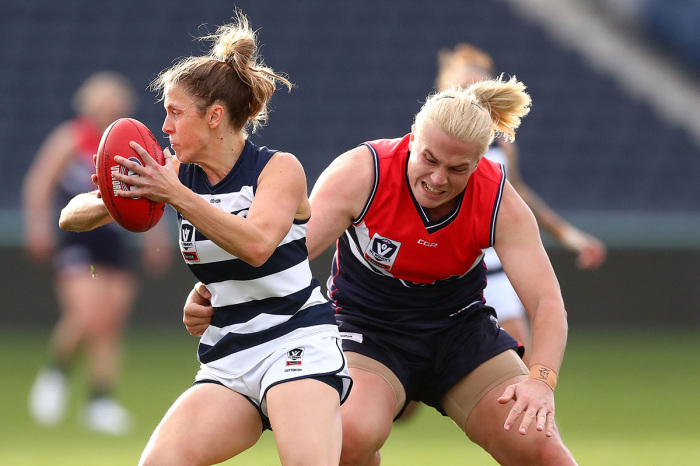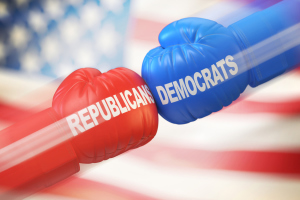The curious case of Kristi Noem

A few weeks ago, South Dakota’s Governor Kristi Noem tweeted, “In South Dakota, we’re celebrating International Women’s Day by defending women’s sports!” She was referring to the state’s “Women’s Fairness in Sports” bill, which would prohibit biological males from competing in female athletics. She then added, “I’m excited to sign the bill very soon!”
As it turns out, she wasn’t so excited after all. After the legislature passed the bill, the Republican governor vetoed it. More specifically, she issued what’s known as a “style and form veto,” asking the legislature to modify the bill. The changes she requested not only gut the bill, rendering it ineffective in its original intent of protecting girls and women, but also do great damage to the legislative efforts in a number of other states.
Portions of the bill, she claimed, “create a trial lawyer’s dream and include lawsuit opportunities that don’t need to be there . . . We could pass a law, get punished, and face litigation for nothing but a participation trophy.” That claim is somewhere between dubious and disingenuous. The South Dakota bill is similar to laws already passed in Idaho and Mississippi and introduced in a number of other states. The Idaho legislation was also backed and defended by 14 states’ attorneys general by means of an amicus brief.
Noem, however, is worried about the NCAA (the governing body for major college athletics). She told Tucker Carlson, “This bill would only allow the NCAA to bully South Dakota, and it would actually prevent women from being able to participate in collegiate sports.” So among the “style and form” changes she requested is that the bill would only prevent biological males from competing against girls in elementary and high school athletics, not at the college level.
But the NCAA has no policy that the South Dakota bill would violate. While the NCAA allows men who have surgically or chemically transitioned to compete in women’s sports (and offers regulations to ensure what they claim is “fair”), as Margot Cleveland points out at the Federalist, “nothing in … NCAA policy requires a college or university to treat a male student-athlete as female.” If they did, they’d lose all the Christian colleges that are part of the NCAA.
Also, the NCAA has no legal standing at the state level, nor does it prevent athletes from schools that do not allow males to compete as women from their events. In response to the Idaho and Mississippi laws passed last year, the NCAA offered a harshly worded denouncement, but nothing with legal bite.
Further, as Alexandra Desanctis reports at the National Review, Gov. Noem “altered the bill’s language to allow athletes to compete based on biological sex ‘as reflected on the birth certificate’ or an ‘affidavit’…” In other words, all it would take for a male to compete against females is “appropriate paperwork changing his legal records to match his gender identity.”
Most pointedly, Noem removes a provision that gives female athletes a course of action if they believe they have been “deprived of athletic opportunities as the result of having been displaced by a biological male.” As a legal advisor told me yesterday, a right with no recourse is no right at all. Not to mention, the bill would also give South Dakota schools the ability to retaliate against female athletes who complain.
“Gov. Noem has offered a hollow substitute for the urgent protections for women’s sports that the South Dakota Legislature sent to the governor’s desk . . . By stalling her support, attempting to dodge the legal conflict, removing protections for collegiate athletes, and eliminating a female athlete’s legal remedy when her rights are violated, Gov. Noem . . . has downplayed the injustices that girls and women are already facing when they are forced to compete against males.”
So, what’s really behind this whole story? Time and again in states like North Carolina, Indiana, and elsewhere, we’ve seen the enormous corporate pressure brought to bear when it comes to LGBT issues, and we’ve seen state officials tempted to cave in face of that pressure. Now, the address on your credit card may very well be out of South Dakota. Since the 1980s, the banking industry has played a major role in South Dakota’s economy, and many banks are committed virtue-signalers on LGBT issues. Not to mention, South Dakota’s tourism industry would be helped by regional and national NCAA tournaments. What’s really at play here, most likely, is the same corporate pressure that other states have faced.
But the pressure can be weathered. Governor Noem’s about-face makes it that much harder for the governors in Arkansas and other states who are currently debating similar legislation. Even worse, it undermines several years of thoughtful, pointed effort to defend the rights of women in sports and elsewhere. If you are a South Dakota voter, please, call the governor and ask her to do the right thing. If you’re not a South Dakota resident, be assured, this issue will be coming to a state near you, soon enough.
Originally published at BreakPoint
From BreakPoint. Reprinted with the permission of the Colson Center for Christian Worldview. All rights reserved. May not be reproduced or distributed without the express written permission the Colson Center for Christian Worldview. "BreakPoint®" and "The Colson Center for Christian Worldview®" are registered trademarks of The Colson Center for Christian Worldview.
John Stonestreet is the President of the Chuck Colson Center for Christian Worldview, and co-host with Eric Metaxas of Breakpoint, the Christian worldview radio program founded by the late Chuck Colson. He is co-author of A Practical Guide to Culture, A Student's Guide to Culture and Restoring All Things.




























